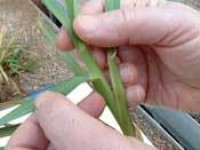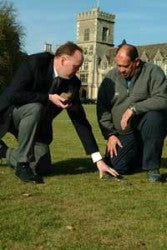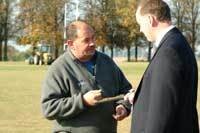Why use a Sports Turf Agronomist?
Why use a Sports Turf Agronomist?
By Noel Mackenzie B.Sc.(Hons), MBPR

A perspective on the role of the agronomist and the relationship with the grounds or course manager.
What is an Agronomist?
This is a very good and fundamental question and one that the industry, particularly the consultancy sector, must address. For the purposes of this article the agronomist is a consultant who earns his/her fees by providing information on the management of turfgrass sports surfaces to achieve better results for their client.
I prefer the more precise terms of 'Maintenance Agronomist' or 'Agronomic Consultant', but this is perhaps distracting from the main issues and for the purpose of this article we shall use the term 'agronomist' since this is what is generally used in our industry. An agronomist is not an unemployed or retired greenkeeper or groundsman, sales rep, or other 'resting' person, they are a professional person acting on behalf of their client to provide unbiased information in the clients best interests. Agronomic consultants are not sales representatives for products or companies, nor should they have commercial tie-in's.

|
Agronomists can help you to identify the grass species that are growing on your grounds and advice on management to modify sward content and therefore wear tolerance, aesthetics or other important criteria to improve your site. |
The agronomist should be knowledgeable in turf grasses and their management. They should have a good knowledge of the grass species and their preferred environments, cultivar performance, materials available for plant nutrition, pests and disease control strategies, principles of soil hydraulics and related drainage/irrigation issues. Ideally, they should have a degree of practical knowledge gained from hands-on management of a sports ground or golf course. It is not necessary for the agronomist to play the sport that they are advising on (though this can help, it is impractical in many instances) but they should have a thorough knowledge of the turf grass implications from playing that sport, e.g. typical wear patterns, soil damage created by particular sports, etc., and the surface requirements of the sport played. Finally, they should be able to communicate in good, clear language, within the visit and the report, the advice they are giving.
The above are the basic requirements. Other skills that are desirable/essential are good interpersonal skills, knowledge of budgeting, an appreciation of the political impacts of their work, ecology and environmental considerations, etc.
It is important that the agronomist is a professional person, after all with the brief description of their skills outlined above who could argue that the skills and knowledge must be regularly updated.
What should the agronomist provide?

On a golf course the consultant normally reports to the committee/proprietor who then passes the report to the course manager. This provides the committee/owner with an independent verification that the issues the course manager has raised are important and offers a degree of direction on issues such as investment, etc. The report also offers a second opinion on the condition of the course which is the club's/proprietor's primary asset in much the same way that an accountant or director of finance would use an auditor to verify that accounts are correct. A good consultant will also manage to provide practical information that the club and its staff can apply to seek improvements to the playing surface as well as providing a report on the overall conditions found. In most circumstances the report is multi-functional and should aid the course manager, committee/proprietor and the membership as a whole.
On sports grounds the consultant may work similarly, especially at a private school or club for example, where the report will be directed to the bursar or club manager to be passed on to the estate manager or grounds manager. The report should provide useful practical advice as well as an overall assessment of the condition of the grounds so that the whole of the readership can gain something from the report.
What do agronomists provide in terms of services?
This will depend on the individual agronomist or the organisation that they work for. In most instances the agronomist should be an expert in maintenance issues that arise at a sports ground or golf course. They should also be an expert in the management options available to overcome the issues that face course or grounds managers so that he/she can perform their job to the best possible standards. They may be able to offer other services such as drainage expertise, etc., but whilst these can be a useful requirement they are not essential since the role could be better filled by a drainage engineer who specialises in this type of issue.
What about the issue of independence?
This is a confusing point for many people. An independent agronomist is not simply someone who works on their own and is not attached to any organisation. Within the consultancy sector there was much debate on this front a few years ago due to concerns from some in the consulting sector that sales representatives and 'technical advisors' were providing advice to clients without clients really realising that they were being 'steered' to buying from one company. In some instances these concerns were justified, in other circumstances it was not and the tactic was used to 'scare' a client away from one consultancy so that another would benefit.
If the agronomist claims to be independent then they must demonstrate that your needs are paramount and that they do not present a commercial bias in favour of any particular company, product or service. If they do, and they claim to be independent, then they are likely to be in breach of the trade description legislation. The exception is where the product recommended is the optimum for that given situation, in which case naming the individual material(s) is certainly justifiable.
Technical representatives from commercial companies or agronomists working on behalf of a company can offer sound advice but it will be limited by the product range available. As an end-user you have to decide if an overall market view from an independent agronomist is most appropriate or whether a limited product choice from a company technical representative is sufficient for your needs. Of course, an agronomist goes well beyond simply recommending products, they also discuss a multitude of other issues that have an impact upon the work performed by greenkeepers and grounds staff.
You and the Agronomic Consultant:
What happens out on site when an agronomist calls should be decided, by and large, prior to undertaking the visit through agreeing the remit or scope of investigation for the visit. However, the relationship with the advisor and your efforts will determine the success of the arrangement. If the groundsman/greenkeeper puts in good effort and has appropriate information to hand the visit will be much easier than if the agronomist has to play detective while someone searches through a shed full of empty seed and fertiliser sacks trying to recall what feed they used in the spring!
Whilst the agronomist is there as a consultant to the organisation they are, or should be, ready and willing to help you to optimise your management programme. This is a good situation to be in as you suddenly have extra help! What is more, it is probably help that will see you through difficulties that arise outside of the visit as you can contact your advisor as and when problems arise.
For some reason agronomy visits can be sources of worry and concern for some people. I have certainly undertaken visits where the groundsman or greenkeeper has refused to 'engage' with me for, I presume, fear that I was there as a hatchet man or had some ulterior motive to undermine their position. Fortunately this has been an infrequent occurrence and is normally resolved by a quick but reassuring chat that we are here to help.
Of course, things can be difficult. For example a client may ask the agronomist to assess whether the turf at their facility is being maintained properly, whether the staff are competent, etc. These are fairly infrequent requests but if handled properly can prevent clubs and staff entering a difficult spiral of negativity and suspicion that can only result in lose: lose outcomes. This support doesn't cost the groundsman or greenkeeper anything as the client foots the bill - what a wonderful way to be helped in your job if you think about it.
|
Example: A Southern Golf Club ~ a few years ago.
The club had a chairman of greens who constantly criticised the Head Greenkeeper. The greenkeeper had been at the club about 25 years and was generally competent, though perhaps not fully up-to-date with the latest advances in technology and greenkeeping techniques. It was suggested that the club put in place a programme of four agronomy visits to assess course condition closely and without prejudice but also to support the greenkeeper in his role and help update and advance his skills and knowledge. This way if there was a problem the club would have evidence of the fact from an independent agent whilst it was hoped that the improvements could be gained in the course to prevent any call for such evidence being necessary. The club captain and chairman of greens ignored the advice and suspended the Head Greenkeeper resulting in a legal situation that cost the club over £25,000 plus costs out of court (it would probably have cost them £50,000 plus costs if it had gone to court but the greenkeeper did not want the hassle). Everyone lost out in a situation that could have been so easily managed. The club lost 25+ years of site knowledge in the Head Greenkeeper as well as the deputy Head Greenkeeper at the same time! It cost the club £25K for the privilege and the club had the problem of recruiting a new Head Greenkeeper and deputy to fill the gap (whilst the grapevine worked overtime about the club and how it had treated its staff). The Head Greenkeeper lost his career. Finally, the condition of the course declined even further!!! Everyone lost out, a classic Lose: Lose outcome occurred, which could so easily have been avoided. |
Choosing an Agronomist:
The criteria for choosing an agronomist will be different for each client. Some may opt for an individual with 'reputation' whereas others may feel more comfortable with a bigger company. Very often the choice may be influenced by the relationships that develop over the telephone or on an initial visit to a facility. The human factor is difficult to account for but should not overshadow the other factors that should determine the choice. The decisions should be based upon some of the following:
1.Sound technical knowledge, particularly the problems created the particular sport(s) taking place on site.
2.A practical understanding of the work of the grounds or course manager and the difficulties encountered in running their facility.
3.A good track record in agronomy consulting over many years.
4.Excellent communication skills and a willingness to help.
5.A strong commitment to quality in both the report and visit.
6.A clear promise not to promote products, companies or additional services unless it is clearly in the clients best interests and any commercial arrangements are transparent to the client.
7.A clear demonstration of appropriate qualifications to at least degree level combined with continuous professional development by the agronomist e.g. BASIS registered, attendance at seminars/symposia, etc.
Signing up for services
Whilst there may be minor deviation from the service agreed when the visit takes place the bulk of the work undertaken should be agreed to form a contract between you and the agronomist prior to the visit. The remit for the visit should detail the scope of works, for example, what areas are involved, numbers of different pitch types, soil testing, etc. The consultant will quote a price which the client accepts or rejects and the visit date is agreed.

|
The grounds manager and agronomist can work through problems as a partnership with the end result being improvements in the quality of surfaces or improved efficiency or effectiveness of management activities. |
Summary:
As an ex-groundsman/greenkeeper and Head Groundsman back in the '80's I would have given my eye-teeth to have had the support and assistance of a well qualified person or organisation to help me fight my corner so that I could do the best for my employer on their sports grounds. The agronomist provides a vehicle you can climb aboard and work in partnership with for both your own and others' benefit. From my own experience I have helped probably half a dozen groundsmen to get their mugshot on the front of The Groundsman magazine simply on the basis of forming a good working relationship and them putting into practice some of the advice offered to give results on the ground.
Choose your consultant wisely and carefully. Do not, as one premiership groundsman once told me, choose on the basis of simply sharing the same jokes and humour as he did (his 'agronomist' sold machinery the rest of the time). Look for the qualities I have outlined above and discuss your issues before signing up to consulting services. A carefully chosen consultant will help you for years, listen to your woes and may even help you advance your career. Enjoy and learn from your agronomic consultant.
Copyright (text and photographs) Noel MacKenzie/Sports Turf Consulting 2004
About the Author:
Noel MacKenzie is the principal consultant and owner of Sports Turf Consulting based in Cirencester, Gloucestershire. He has worked on all types of sports turf surfaces as a consultant for the past 11 years and has a further 2 years experience as an Ecologist and 5 years as a groundsman/greenkeeper and Head Groundsman.
Contact details:
Sports Turf Consulting
c/o The Royal Agricultural College
Stroud Road
Cirencester
Gloucestershire
GL7 4EW
Tel/fax: 01285 641825
Email: nm@sportsturfconsulting.co.uk
Web: www.sportsturfconsulting.com
